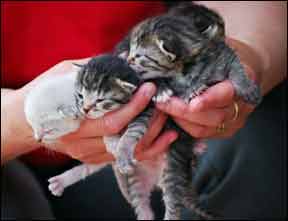Consider this: One cat and her offspring can produce a whopping 420,000 cats in just seven years. Each year, from April to November, hundreds of thousands of kittens are born – often to feral or stray moms that scavenge out a meager existence on our 288 city streets, in the suburbs, and in rural areas across America. Without human intervention, most of these newborns will die or, at best, lead short, miserable lives. The moms that are not killed by cars, other animals, or disease, will repeatedly become pregnant, adding to the already crushing pet overpopulation problem. Whats a caring animal lover to do? Aside from ensuring that your own cats are spayed and neutered, consider fostering a litter of homeless kittens. Sadly, many animal shelters dont have the staff or resources available to care for kittens that are ill or too young for adoption. Newborn kittens that have lost their mom must be bottle-fed around the clock and their tiny bladders and bowels must be expressed on a regular basis. Animal shelters that have kitten foster programs in place need dedicated people who are willing to welcome kittens into their home and nurture them until they are old enough to be placed for adoption. Getting Started. There are few activities more rewarding than providing a temporary home for abandoned kittens. These tips will help you prepare for your new arrivals: Ideally, place your foster family in a separate room, especially if you have other animals. Make sure the kittens new digs are quiet and secure and well equipped with soft blankets or towels, a large cardboard box or cat carrier, a heating pad (put the setting on low and cover it with a towel), shallow food and water bowls, small litter boxes, scratching posts and toys (a humble cardboard toilet paper roll, feathers or string can entertain kittens for hours). Purchase an inexpensive, grocery-store brand of cat litter – make sure it is unscented clay litter – NOT clumping litter. Young kittens tend to nibble on litter and the clumping variety can become impacted in their stomachs, causing severe illness or even death. Kittens grow quickly and by the time they reach two pounds (at approximately eight to nine weeks of age) they can be spayed or neutered, tested for various illnesses and receive vaccinations. If you are interested in giving abandoned kittens a healthy start in life, call your local humane society or animal shelter and inquire if they have a kitten foster program. 



